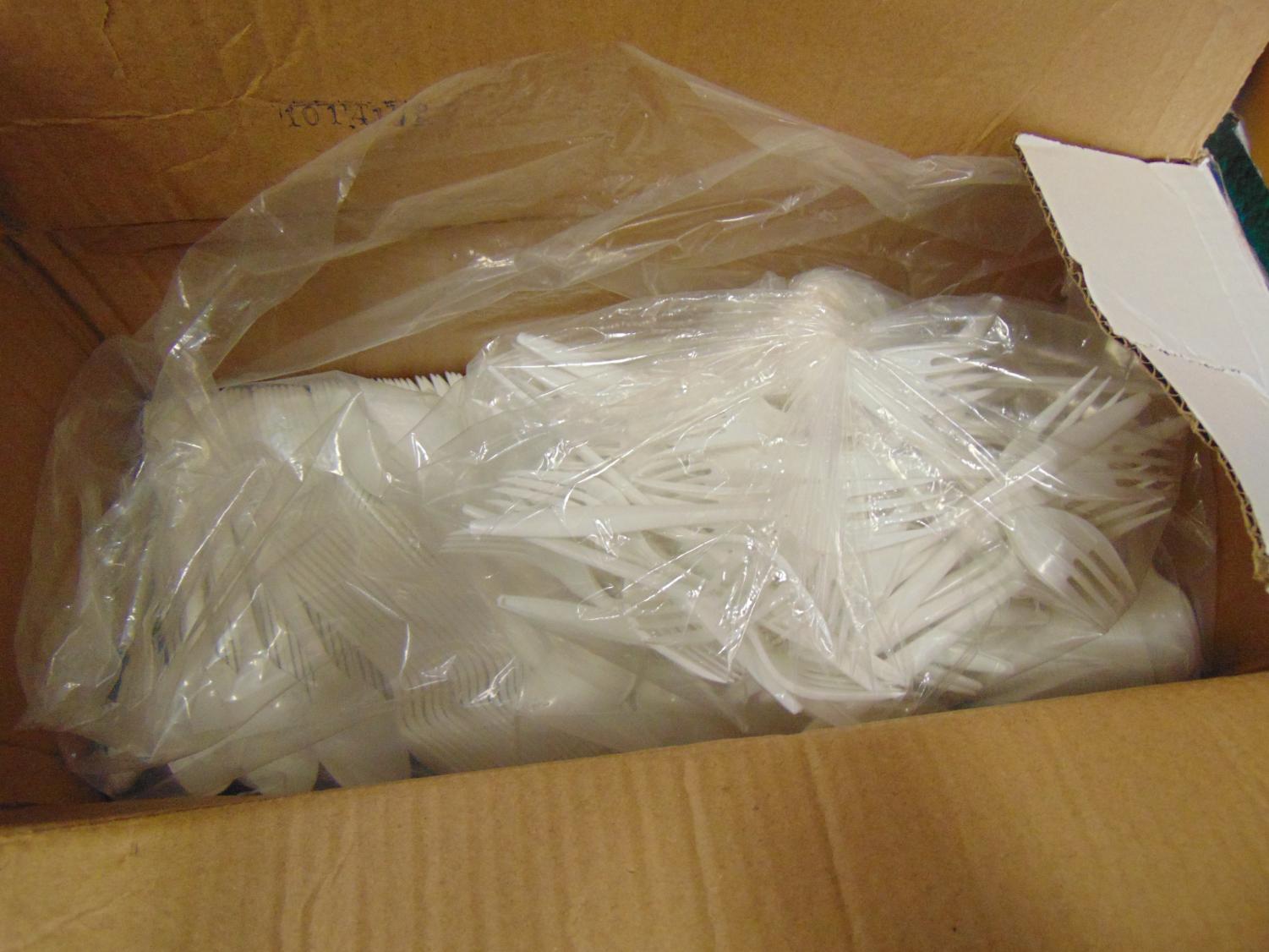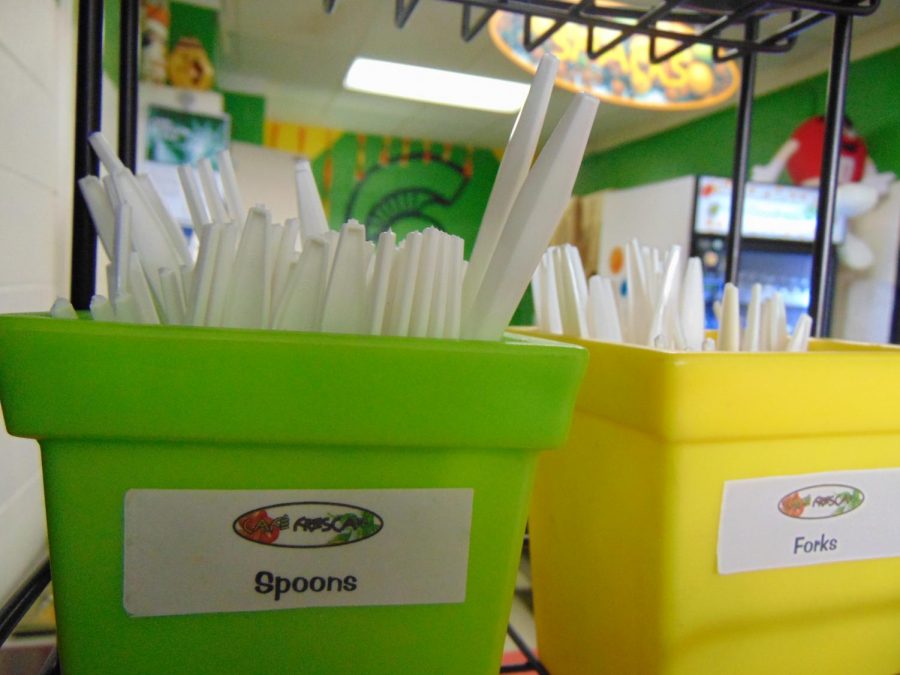Reducing Waste at Doherty Needs to be Prioritized
Is this the last straw?
Baskets of plastic silverware are filled and set out for students everyday at lunch.
Every day, more than 500 million plastic straws are used once, and thrown away in the U.S alone. Americans also throw away 25 billion Styrofoam coffee cups daily. And 6 million tons of single-use plastics are thrown into landfills every year. Only 15% of the world’s plastics are recycled, and 78 million plastic packaging products are produced every year. While you may be thinking you need to brush up on your recycling, the issue has escalated and recycling can only do so much. “I think that we, as a society, are often mistaken when we consider anything disposable,” says Mr. Nelson, Doherty High School’s Environmental Science teacher, “We have really created a consumptive culture. Even considering a recycling effort with [single-use] products is only adding to the problem.”
The issue no longer lies in reusing our waste, as most of isn’t made to be eco friendly, but in reducing the amount we produce altogether. We need to think about the long term lifespan of our packaging after we’re done with it. Styrofoam can’t be completely recycled, and consequently, most of the styrofoam thrown out today will still be present in landfills 500 years from now. Though sadly, these facts probably aren’t as shocking anymore as they seem. We all know there’s an issue, but we’re also all guilty of compromising for the convenience of our daily Dutch Bros and grocery bags.
However, a small-scale solution is on the rise, and it may bear long-term benefits for our planet. Boycotting plastic straws and silverware is the name of the game, and even large companies like Starbucks are lining up to play. They announced back in July that by 2020, they’ll be a completely straw-free business over all 28,000 of their stores worldwide. Starbucks has also developed a lid that doesn’t require a disposable straw, and has already integrated it in over 8,000 stores.
Other corporations working toward change include Disney, American Airlines, Hyatt, Alaska Airlines, SeaWorld Entertainment, Bon Appetit, Royal Caribbean, and Marriott International. It’s also possible to contribute to the effort in businesses that aren’t working towards green alternatives. Lots of people around the world are investing in metal or glass straws, and bamboo silverware to take to restaurants in place of using the plastic utensils provided. So if mainstream businesses and restaurants can make the change, why can’t we?
There’s a couple ways we Spartans can really step it up to help cut the excess, starting with reducing the amount of plastic we use everyday. Our cafeteria serves around 600 students that come to school all 180 school days of the year. If you’ve ever worked your way through the lunch line, you can see that every student gets a styrofoam-like plate and at least a plastic spoon or fork to eat with. Doherty’s own building manager, Mr.Ted Aguilar, reports “During the course of one day, we probably get 15 to 18 bags of trash.” Our cafeteria manager, Ms. Kehl, clarifies that “We serve about 325 to 350 a day for lunch and probably 225 kids for breakfast, so [we serve] about 600 kids a day.” But the question is, just how much of that trash is actually single-use plastic? “[Every month, we get] probably in the neighborhood of 6 or 7 boxes, and there’s 1,000 [utensils] in a box,” says Ms. Kehl. That’s at most 7,000 plastic utensils being thrown out from Doherty alone, every month. Mr. Ted said, “If we put thought into not creating as much trash, and especially recycling, I think we could make a big change.” Though despite the bleak numbers, many other schools across the country agree, and have started looking into different alternatives that may help decrease the amount of waste they’re producing.
The Minnesota Pollution Control Agency performed a case study between two middle schools with populations reaching 2,000, just like us. The schools were granted money to switch their annual 700,000 plastic utensils to 12,000 reusable metal ones. In the end, they found that they prevented 6,712 pounds of trash, and they reduced their greenhouse-gas emissions by 77%. Despite needing to wash the new silverware, the school saw a substantial reduction in how much water they used. The schools were also expected to save $23,000 dollars over the following 3 years, and per-annual-student costs dropped from $6.89 to $4.89. Another school, Little Cedars Elementary in Washington, estimates that the use of reusable silverware will save them 38 bags of waste every year. They also are expected to save $1,800 annually without having to buy cases of utensils. We may also look into compostable lunch trays, like the schools of the Urban School Food Alliance did back in 2015. The trays made of recycled newsprint replaced the old polystyrene or styrofoam trays at only 9 cents more. The schools also saved $50-$100 on average per ton of trash going to landfills, after switching to $20 per ton to compost.
There’s some gray area in our execution, but an efficient transition could also have some really dramatic benefits for Doherty. Ms. Kehl says “I don’t know that it would [affect the kitchen’s efficiency], other than we would have to wash it every day, so that’s a lot of silverware to wash…We do have a dish machine that washes for us and sanitizes, but then we have to dry it.” Although looking back at the Minnesota case study, the schools estimated that they’d have more time after keeping the time required for storing, unpacking, and disposing of silverware, over the span of the year. Mr. Nelson suggests we “pay extra to get steel and not aluminum,” to ensure the utensils lifespan, and invest in “magnetic-chutes that cover the trash cans.”

A box of plastic silverware waits to be used at Doherty High School.
It’s time to use our resources, and make Doherty High School an environmentally conscious and conservative school. The Plastic Free Schools organization aims to dramatically reduce the amount of plastic reduced in schools across the nation, “with a special focus on the reduction and ultimately the elimination of plastic bottles, plastic straws, and utensils” Their message extends to us in the Springs, adding that “any school or student group with the intention of fighting plastic pollution is eligible to join.” This is our chance, Spartans, to act as pioneers in steering our community in a positive direction. Though reducing our output in the school setting may not reduce the damages of pollution on our planet, it can help to prevent further negative development and allow for equilibrium.


Esther Yates • Mar 2, 2019 at 7:17 pm
Great article, Marynn. I am quite sure you know of your cousin in Guam getting a bill passed in eliminating plastic bags, etc..